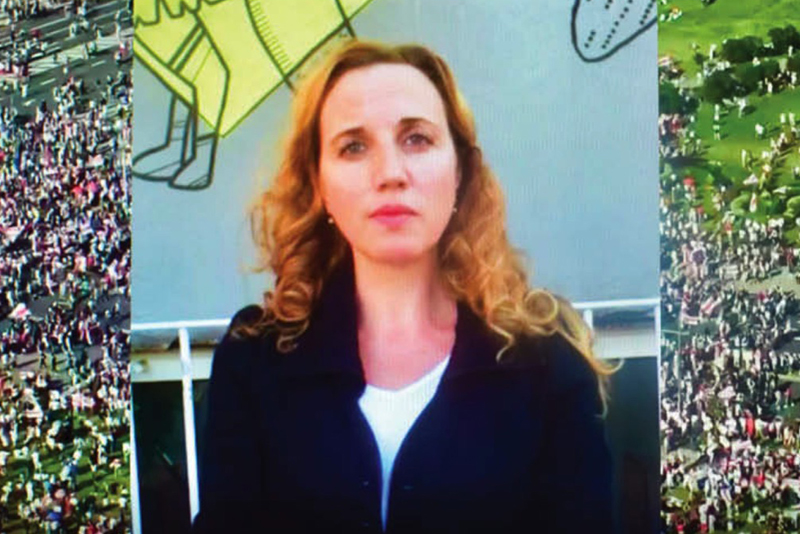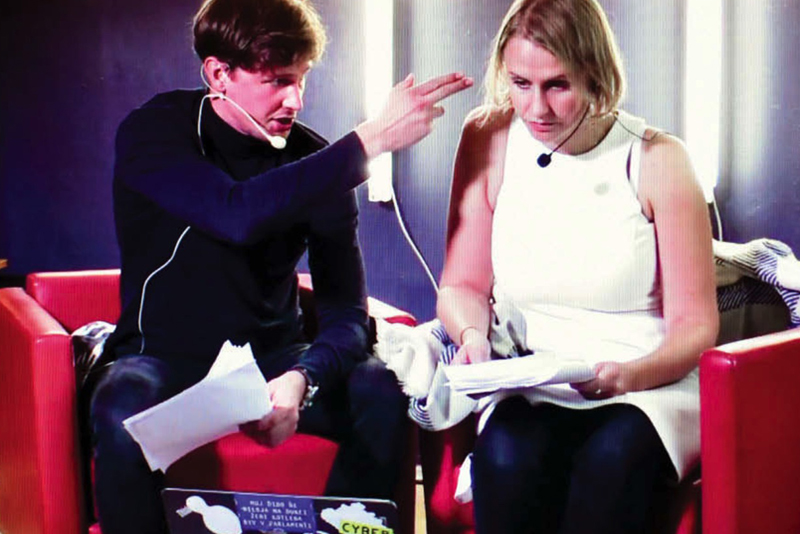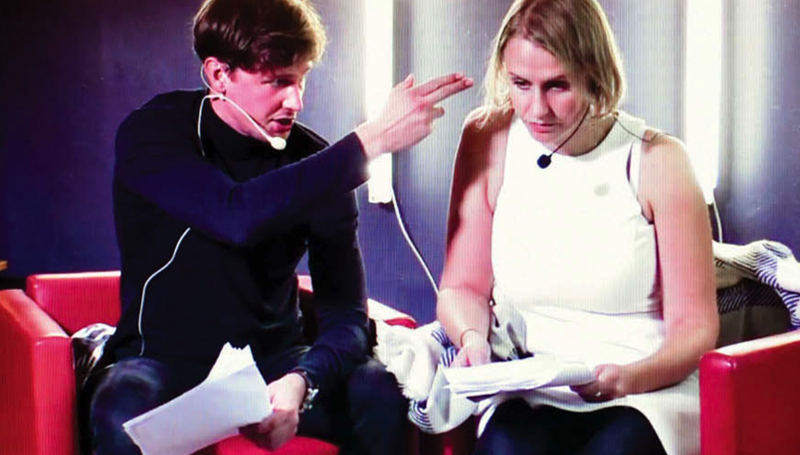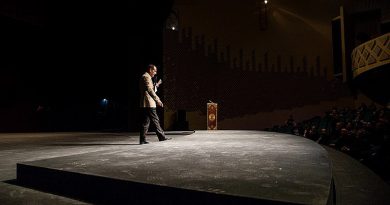The Making of “Insulted. Belraus”
The making of Insulted. Belarus: John Freedman on How Revolution in Belarus Sparked a New Approach to Political Theatre
23 October 2020
I had been reading Andrei Kureichik’s Facebook posts leading up to and following the aftermath of the transparently corrupt Belarusian presidential election on 9 August 2020. Kureichik, the leading playwright and screenwriter of Belarus, led me and hundreds of his followers to videos, articles, interviews, and eyewitness accounts describing not only the brutally fraudulent activities of President Alexander Lukashenko but also the criminal actions of what some were increasingly calling his “Praetorian Guard”: heavily armed stormtroopers who mercilessly threw protesters into the notorious Okrestina Prison. There, detainees were further tortured and abused physically and psychologically. It was hair-raising stuff. It made one feel powerless.
Then, totally unannounced, on 9 September at 3:13 p.m., l received the following letter on Facebook: “Dear John, I’ve written a play. I finished yesterday. About what is happening in Belarus right now. I want to send it to you. Read it. Maybe it will be possible to translate it and bring it to the attention of people in the West. Maybe publish it or have it read somewhere. l think it is important. l tried to describe a lot of important facts in it.” This inauspicious beginning put in motion a programme — the Insulted. Belarus worldwide readings — that flourished in a way we never expected. The result is that we significantly raised awareness internationally about this devastating political conflict.

Anna Sirotina as Svetlana Tikhonovskaya in Oksana Mysina’s film
Insulted. Belarus. Credit: John Freedman
As l write these lines, seven weeks after receiving that letter, we have organized translations into 18 languages and had 77 readings, productions, videos or films in 22 countries. There are many more to come. I am often asked why Insulted. Belarus took off so. Why are so many taking it to heart, falling under the sway of the story it tells? My initial searching answers have now coalesced into what I think is a coherent and legitimate three-pronged response. First is the quality of the play. Andrei Kureichik achieved the nearly impossible. While on the run with an arrest warrant hanging over him, he wrote a tremendously powerful play about a major social and political event that was transpiring around him even as he tapped on his computer keyboard. “Headline” plays written in the heat of perilous political upheaval might occasionally become “popular” and affect public opinion. But the number of those plays that hold up to strict artistic standards are few and far between.
Isolating seven characters ranging from Belarusian president Alexander Lukashenko and his teenage son to a maniacal storm trooper, a football hooligan, and a young protester drawn into a maelstrom of violence, Kureichik wrote a play that will last. Mixing documentary drama with his own creative, interpretive inventions, he created a tale that distils the essences of political perfidy, individual stupidity, and cowardice blended with personal and collective courage. He wrote a play that will become a national, heroic drama in Belarus, although it also speaks to many nations battling authoritarian or dictatorial governments. Participants in Hong Kong, the United States, the United Kingdom, Ukraine, Turkey, and Nigeria have told me that the world of lnsulted. Belarus (as the play has come to be titled) reminds them of events taking place in their own countries. Second is the topic itself: the equally terrifying and beautiful revolution in Belarus. The images — both the actual photos and the images conjured in Kureichik’s play – are riveting. Hundreds of thousands of peaceful Belarusian citizens, often led by women dressed in red and white, take to the streets with flowers in their hands and songs on their lips and are met with gunfire, truncheons, stun grenades, ferocious beatings, and military hardware straight out of a Hollywood post-apocalyptic blockbuster. The revolution is headed by Svetlana Tikhanovskaya, another of Kureichik’s characters and one of the most incongruous political leaders imaginable. A soft-spoken, self-proclaimed housewife with no interest in politics, she was so incensed when Lukashenko imprisoned her husband, one of several presidential candidates who were arrested before the election, that she ran in his place. Whatever legal method you use to count the votes, she won in a landslide.

Ondřej Dvořák and Milada Vyhnálková in a reading at the 4+4 Festival in Prague, Credit: John Freedman
Doesn’t everybody love a fairy-tale? Beauty and the Beast? David and Goliath? A new instalment of Wonder Woman?
And then, finally, there is the undeniable influence of the coronavirus epidemic. At a time when theatres all over the world were closed up tight, when actors and directors were confined to their homes, just as bored and fidgety as audiences were, Insulted. Belarus appeared seemingly out of the blue to offer material that everyone could sink their teeth into. The Zoom app and the Facebook Live capabilities would seem to have been created precisely for the Worldwide Readings project. Costing nothing, and requiring no especial technical talents, these platforms meant that everyone was equal in their ability to conduct a few rehearsals and then present a new play to an international audience. Even if arranging live streams was beyond some groups’ technical means, simply recording a reading and uploading it to YouTube was not.
A letter I received in early November from Dr Cami Rowe at the Lancaster Institute for the Contemporary Arts in the UK summed up almost everything I have just described: “We had our first in-class reading on Thursday with students and a small group of spectators, and it was amazing. I can’t put into words how impactful this has been for my students — they were visibly moved, despite having read the play through themselves previously. We had a good discussion about the impact of staged readings as a mode of Theatre for Social Change, but mostly they are now very attentive to the ongoing situation in Belarus, which they were mostly ignorant of previously. My group will be recording a second, online reading hopefully by the end of this week.”
Not surprisingly perhaps, many universities and institutes participated in the project. They have included Illinois University, Illinois State University, and Harvard University in the US, Lancaster Institute and Maketank in the UK, Palacky University Olomouc in the Czech Republic, and Bratislava Theatre Institute in Slovakia.
But the responses from major companies throughout the world surpassed my wildest dreams. They included the famed Teatr Dramatyczny in Warsaw, Poland; the last National Theatre in Romania; the Akhmeteli Theatre in Tbilisi, Georgia; Gabriele Tuminaite’s mighty State Small Theatre of Vilnius in Lithuania; the Blank Space Studio in Hong Kong; the Arojah Royal Theatre in Abujah, Nigeria, and many more.
The Royal Dramatic Theatre of Stockholm, Ingmar Bergman’s former artistic home, mounted a powerful reading on stage before a socially distanced live audience that included Ann Linde, Sweden’s Minister for Foreign Affairs. Her reaction: “Heart-breaking.”
Kureichik’s own reaction was understandably memorable: “It’s an incredible feeling when you listen to your play performed in Swedish by actors you remember from Ingmar Bergman’s films. The fact that they came together to present a drama about our situation [in Belarus] and delivered an incredibly strong, emotional, artistic, and stylish reading — practically a performance — on the stage of one of the most respected theatres in the world, the Royal Dramatic Theatre of Stockholm, was very inspiring. Yesterday was one of the main milestones of the lnsulted. Belarus project.”
Kureichik then turned to another aspect of the project, one that was always in the forefront of our minds. He said the discussion following the Swedish reading touched “specifically on helping those who have lost jobs, on rehabilitating those who have experienced physical or mental trauma, on blacklists for sadists and criminals”.
All participants were encouraged to publicize four foundations collecting donations to help Belarusians who have suffered for defending their rights and freedoms. There is no way of knowing the response to these calls, but a few theatres were extremely active in this sphere.
lgor Golyak’s Arlekin Players in Boston (hosting four readings and an online conference) and Vladimir Rovinsky’s Theatre Novi Most in Minneapolis (hosting three readings) always placed donation information prominently in their publicity and social media. This was true of Bryan Brown and Olya Petrakova’s company at the Maketank theatre space in Exeter, UK, which, in addition to organizing two online readings, created a storefront window display that stood in place two weeks to inform local passers-by about Kureichik’s play and the situation in Belarus. lt had to come down when a new lockdown hit the UK in early November.
The reality of Covid-19 did not pass the project by untouched. One potential participant in the US cancelled when her husband died of the coronavirus. Three of the seven actors in a film, a “cinematic reading” that Oksana Mysina made for Russian Rain TV, fell ill with coronavirus during the post-production process. (All actors filmed themselves in isolation; the sources of their infections lay outside their work on Insulted. Belarus.)
Potential conflict of interest disclosure: Mysina is my wife.
The artifice of this film segued dangerously with the reality of the revolution when Anna Sirotina, the actress playing Svetlana Tikhanovskaya, was arrested on the streets in Minsk for participating in a protest rally. Thankfully, she was released nine hours later though subsequently she was banned from entering Belarus for five years.
As the organizer of this project, I am not prepared to draw grand conclusions about it yet. lt is still expanding at a swift rate. One thing is clear, however: Tens, or even hundreds, of thousands of people scattered across the globe have acquired first-hand information about a revolution that, even ten years ago, would probably have been considered quite “remote”. Actors from Africa, China, the United States, the United Kingdom, and most of Europe have had the opportunity to put themselves — and their audiences – into the shoes and inside the heads of victims and perpetrators of violence in Belarus. In part thanks to Andrei Kureichik and his play Insulted. Belarus, this revolution is neither obscure nor secret.









